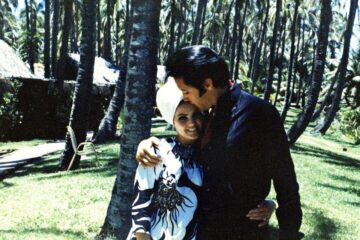Outside of his musical exploits, John Lennon dedicated much of his existence to political activism and awareness. Particularly during the period after the break-up of The Beatles, Lennon, along with Yoko Ono, were often noted for their protests against the war in Vietnam and the right-wing position of the US government. However, the musical superstar often seemed out of touch with the political struggles of America’s disenfranchised youth, and the songwriter did very little to combat that reputation.
During the early days of Lennon’s career, the songwriter was almost exclusively concerned with pop music, and, as a result, The Beatles rarely got involved in the political sphere. It was only when the Fab Four unveiled the song ‘Revolution’ in 1968 that audiences got a glimpse at the political views of Lennon and McCartney. Despite the politically tumultuous context in which the song was released, including the violence of the Democratic National Convention in Chicago just days after the song’s release, ‘Revolution’ opted for a pretty spineless political stance.
Essentially, the track discouraged activists from becoming radicalised, with Lennon declaring that “it’s gonna be alright” regardless of whether people protest against the oppressive policies of the state or not. This complacent and naive standpoint was, at the time, incredibly disappointing for many members of the counterculture movement, who saw Lennon as having betrayed the revolution while so many other musicians were voicing their support.
Over the course of his solo career, Lennon became increasingly politicised. In fact, his first solo single, ‘Give Peace A Chance’, became Lennon’s lasting political legacy. The anti-war anthem quickly became one of the defining cultural moments of the Vietnam War, yet its inherent message was still problematically simple. Within the track, Lennon denounces seemingly all political ideologies, “This-ism, that-ism, ism ism ism”, opting instead for the frustratingly naive message of peace, without any kind of critical analysis or criticism of those responsible for the war.
On the one hand, it is not the job of pop stars like Lennon to provide a political identity, but his oversimplified, blinkered view of political struggles like the anti-war movement or the civil rights movement gave ammunition to those in power who wished to discourage the hands-on protests organised by activists. Marches, protests, and public defiance were discouraged by those in power, so it was disappointing to see Lennon align himself with that side of the argument.
Ultimately, it would have been difficult for Lennon to fully understand the plight of the working class in America, given that he was a globally successful and incredibly rich Englishman who was largely out of touch with the real world. Yet, the songwriter seemed determined to carry on making these spineless political tracks that only served to put down the protestors he should have been supporting.
The former Beatles became more radical in his views, particularly on the track ‘Power to the People’ which denounced the complacency of ‘Revolution’, “Say you want a revolution, we better get on right away, well you get on your feet, and into the street.”
During this time, Lennon even hinted at newfound Maoist beliefs, telling Rolling Stone, “I really thought that love would save us all. But now I’m wearing a Chairman Mao badge. I’m just beginning to think he’s doing a good job.”
While this move towards more radical politics did help raise awareness of Maoism as an alternative to the capitalist system of the United States, it was too little too late for Lennon. His misguided political efforts caused a lot of damage to legitimate political movements by denouncing their members as foolish and violent individuals. He could never be expected to understand these issues from his incredibly privileged position truly, and he made little effort to do so anyway.



